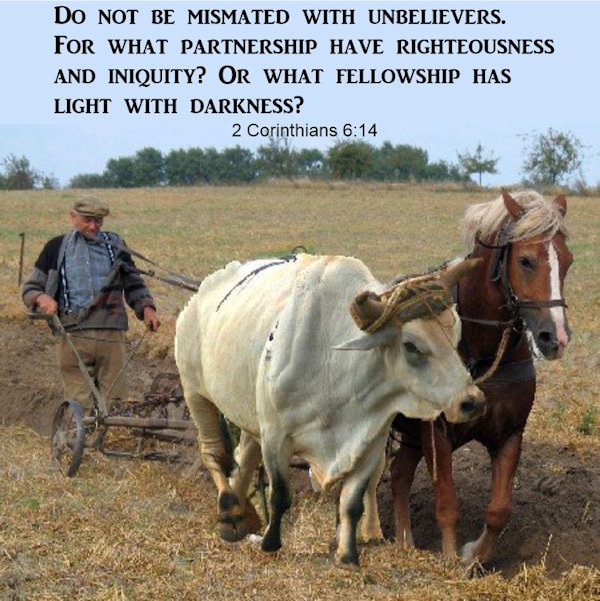Bible study Daily, explanation and encouragement - 2 Corinthians
2 Corinthians 1:3-4

Paul suffered greatly (2 Cor. 11:16-29; 12:10), but he was always ready to encourage others. Everyone around us today has problems, afflictions and difficulties. Christians in many parts of the world suffer tremendous persecution. God helps and encourages us to help and encourage others. He wants us to become channels of what we receive from Him to other believers who so desperately need help. We do this through prayer, and the gifts of the Spirit, providing practical help wherever possible. God does not want us to keep to ourselves what we have received from Him. In the same way that God is at our side to encourage us even in the most difficult trials, so we must be at the side of those who are being tested.
2 Corinthians 1:20

If we pray in the Holy Spirit, we can always be assured that all things will work together for good (Romans 8:27,28). God is great and powerful; There is no situation that He cannot use for good when we pray and trust in Him. We cannot dare to pray the way we want, but the way the Holy Spirit guides us. I believe that believers who pray filled with the Holy Spirit receive a "yes" and an "amen" from God, as we read in 2 Corinthians 1:20.
2 Corinthians 1:21-22

Here, Paul gives four participles that describe God's faithfulness: GOD IS WHO
1) confirms us in Christ,
2) anoints us,
3) seals us
4) gives us the Spirit as a pledge.
The power and ability to confirm in Christ all came from God Himself. The promises are not only ours through Christ; God, by His Spirit, has performed a threefold work in us which makes us confirmed in Christ. The anointing, the seal of ownership, and His Spirit in our hearts as a pledge, or deposit, describe what occurs in the baptism with the Holy Spirit. Anointing refers to receiving the same Spirit that Jesus (the Messiah, the "Anointed One") received after He was baptized. The seal was an external identifying mark, or sign of ownership, of a purchased possession. The pledge (or guarantee) concerns the Spirit and his gifts as the first installment of what we will have in its fullness when Jesus returns. The Holy Spirit is a legal figure for the first payment, which is a guarantee of full payment. A part of the future that is already present, and thus becomes the guarantee of the future.
2 Corinthians 2:10

- 2 Corinthians chapter 2 from verses 2 to 11 talks about a "sad letter" that Paul had to write that was motivated by the offense of a certain person in the church in Corinth. But Paul, in his delicate consideration for the dignity and feelings of individuals, does not even mention the offender. This person should be completely forgiven by everyone.
- As the church, reacting to Paul's letter, had taken steps to punish the offender, Paul's plea is for mercy on behalf of the man who was their enemy. The rebuke given by many was enough for the situation. "The majority" suggests a minority that would not comply with disciplinary measures. The purpose of punishment was not revenge, but restoration.
- What Paul has in mind when he says SO THAT SATAN DOES NOT HAVE ADVANTAGE OVER US is that if he and the church kept their forgiveness away from the offender, Satan could perfectly gain control over the Christian brother again through his excessive sadness. But equally harmful would be the presence of a harsh and spiteful spirit in their own hearts. By such a spirit Satan could defraud them of their joy and peace in belief (Rom. 15:13), and of the bond of love (Col. 3:14) which should characterize the church as a saving fellowship. Satan cannot use our good against us, for evil.
2 Corinthians 2:17

- The image is originally that of a tavern keeper who mixes bad wine with good wine to increase his profits. This image contains two ideas. The first concerns motives; they turn the apostolate into a business for personal gain (this behavior is old). The second implies the method; they adulterate the Gospel with more palatable demands and limited perspectives in order to serve their own interests. The first leads to the second. In fact, adopting the ministry for reasons of personal gain, ambition or vanity already means adulterating it. He who makes the Word serve his purposes - instead of being a servant of the Word - changes the very character of the gospel.
- Contrary to these “peddlers” who try to get whatever price they can and model the word of God accordingly, is the absolute sincerity of Paul's ministry. It is the character of the gospel that qualifies both the motives and the method of his ministry.
2 Corinthians 3:2-3

- There is a film called "letters to God", this film tells the story of a boy of about 8 years old who suffers from cancer and who writes letters to God in the form of prayers. When the postman picks up these letters, he does not know what to do, but reading the letters brings comfort to him as he is going through some problems and the faith of that child in the midst of adversity inspires this postman.
- The apostle Paul says in verse 3:3 that WE ARE LETTERS OF CHRIST, ministered by us and written not with ink, but with the Spirit of the living God, not on tablets of stone, but on the tablets of flesh of our hearts. Some have heard the expression "blank slate" - how the apostle uses the word tablet is that in the past writing was not on paper as we know it today but on wooden tablets and the slate was the empty tablet, without any writing and so begins the our life, our story is being written over the years.
Sometimes the lyrics are very beautiful, neat.
Other times they are hastily written scrawls.
Sometimes it is difficult like those writings left on tree trunks, made with a pocket knife, you have to use force, otherwise you would not be able to. And crazy, sometimes it is written with a pencil, and then erased and forgotten.
At some points, our story is written with a strong ink pen and we try to erase it, rub the eraser so much that the page almost tears, and we manage to diminish that memory a little.
Sometimes the ink is smudged because tears wet the paper.
But there is a part, the most beautiful and vibrant, that was not written with human devices, but WITH THE BLOOD OF JESUS, which is the story of our salvation. Written by the Spirit of the Living God and engraved in our hearts. WE ARE LIVING LETTERS! God tells the world a story through our lives.
A letter involves three parts:
1- Who writes
2- The message contained in the letter
3- The effect of communication on the recipient.
In the Bible, we read about many letters: letters of invitation, letters of threat, letters with decrees, etc.
In ancient times, letters were written on stone tablets. In ancient Rome, tablets with a thin wax coating were used to write with a kind of stylus. Which reminds us of the expression "stone tablets".
Throughout our history the tablets of our life is being written; some scenes in our life seem to be written like a knife on a tree trunk, it is painful, hard to forget ... others, it seems that they were written with a pencil, which with eraser, easily erases and does not even remember.
However, the most beautiful writing in our history is written in red ink, with the blood of Jesus, which was the day of our salvation !!!
Paul says we are living letters! The Lord our God every day writes through us to the world !!!
Beloved ones, what has the world read about Christ through you?
Think about it ...
2 Corinthians 3:17

- Those who are in Christ have the veil removed from their hearts and minds, so that they can have the freedom to serve God and reflect the glory of the Lord, the glory of Christ (2 Cor 4:4; Rom 8:29; Heb 1:3). This is a process in which we are transformed from one degree of glory to another as we are transformed into the likeness or, as one writer says, "into the transparent symbols of the self-giving creator." This is the sanctifying work of the Holy Spirit and will be complete when Jesus returns again (1 John 3:2; Rev 22.4).
- By saying "the Lord is Spirit", Paul is identifying the Spirit with Christ, not in personal identity, but in redemptive action (Gal 3:5; Rom 6:8).
2 Corinthians 3:18

For just as a mirror reveals physical characteristics so that one can groom oneself correctly, so the constant vision of Christ by faith reveals the defects of the Christian character and inspires their correction. The transformation that results is a transformation from glory to glory, that is, Christ likeness. This transformation penetrates the inner life of man and will not end until the day we see Him “face to face”. Then we will be like Him; because we will see it as it is. The freedom of the Spirit's new covenant includes not only the crucial moments of forgiveness of sins and purification of the heart, but also emphasizes the continued sanctification of all life. This process only reaches its fullness in glorification in complete conformity with the image of the Son of God.
Dedicate time to being holy. The world moves very quickly. Spend lots of time alone with Jesus. When you look to Jesus, like Him you will be; Your friends, through your behavior, will see the similarity you have with Him.
WHAT TO DO WHEN FAITH LOOKS WEAK AND THE VICTORY LOST?
Acknowledge the source of opposition in the person of Satan and resist firmly.
2 Corinthians 4: 4 says that satan is the god of this world (he has a right to be here)
John 10:10 says: The thief (satan) comes only to steal and kill and destroy; I (Jesus) came that they may have life, and have it abundantly.
Hold your position! Do not give up on something that is good, that is in accordance with the Word, but, recognize that it is satan who seeks to prevent it from happening.
Satan does not want the unbeliever to believe in the Lord Jesus Christ.
Satan does not want the believer to let go of his or her worldly life and recognize Jesus as Lord and live under the control of the Holy Spirit and according to the Will of God the Father.
2 Corinthians 4:4

THE GOD OF THIS CENTURY (Mark 3:22; John 12:31, 14:30; Eph 2:2, 6:12; 1 John 5:19) HAS BLINDED THE UNDERSTANDINGS OF THE UNBELIEVERS. Satan, who is against God, exercises a limited and temporary but very real sovereignty (Mt 4:9; Lk 4:6) during "this present evil age" (Gal 1:4). This dominion extends over all those who devote sincere obedience to any cause that compromises the eternal purpose of God's grace. Thus, even the Law, being misinterpreted and misused by Jewish legalists, could become a demonic force and lead a fanatical Saul of Tarsus to persecute God's church (1 Cor. 15:9). In the same way, "the princes of this world … have crucified the Lord of glory" (1 Cor. 2:6). Such "princes of the darkness of this age" (Eph 6:12), over whom Christ triumphed (Col 2:15), prevent the light of the Gospel of the glory of Christ from shining upon those who refuse consciously to believe, which is the image of God. Thus, as they are blind to Christ, God remains hidden from them.
2 Corinthians 4:6

Paul's self-exaltation was completely excluded from the gospel ministry by the very nature of his conversion encounter with the resurrected Christ. On that occasion, the God of creation, who with a word dispelled darkness with light (Gen 1:3) had personally illuminated Paul's darkened life in a marvelous way - for the illumination of the knowledge of the glory of God, in the face of Jesus Christ. In that light that God lit in his heart, he saw the face of Jesus Christ, and he knew that the glory that shone was the glory of God. In the enduring reality of this experience is Paul's unique qualification to be a minister of Christ. The light of God illuminated his life so that he could also illuminate other lives with the knowledge of the glory of God in the face of Jesus. The anchor of the apostle's ministry was not in himself.
And today, each of us that Christ has enlightened is so that we can bring this light to others who are in darkness. Beloved, do not wait for a position in the church to work for the Lord. Use your free time to spread the Word of God. The other day I was walking back from my son's school, it was early, a woman stopped me, said good morning and handed me a small piece of paper containing a verse. She was hiking and also spreading the Word of God. There are simple things you and I can do. In the parable of the talents, the one whom the Lord reproved was because he had done NOTHING! Let us act because time is running out.
The writer Watchman Nee in "The release of the Spirit" comments on the difficulty of the treasure of Jesus' life to reveal Himself in us, the earthen vessels.
He says that it is not our weaknesses that prevent God from revealing Himself, but our strengths: wealth, intelligence, popularity, beauty etc. And until we are willing to be broken by God in our strengths, so that He uses us as He wants, these are characteristics that will draw attention to us and not the treasure hidden in us. The treasure inside the clay pot is only revealed when the pot is broken. God will reveal His greatness and His power in our weaknesses.
But He said to me, "My grace is sufficient for you, for my power is made perfect in weakness. I will all the more gladly boast of my weaknesses, that the power of Christ may rest upon me. 10 For the sake of Christ, then, I am content with weaknesses, insults, hardships, persecutions, and calamities; for when I am weak, then I am strong" 2 Corinthians 12:9-10.
2 Corinthians 4:7

- Paul is entrusted with this treasure of the Gospel, "the illumination of the knowledge of the glory of God." But he considers himself as an ordinary and fragile earthen vessel. The allusion may be to a clay jar where precious treasures are often hidden or to a small and cheap clay lamp. The minister has a fragility that includes his complete person. But man's weakness only serves to magnify the message. IT IS THE MESSAGE THAT HAS VALUE. The inferiority of the human vessel demands and proves that the EXCELLENCE OF POWER IS FROM GOD and does not come from us.
- Do not be shy about preaching the gospel of Christ because of physical aspects such as thinking you do not speak well, that you do not know difficult words, that you do not have a large vocabulary, because you do not have expensive branded clothes, and many other reasons. The message is clear, the glory is for God and not for us for our good performance. Do the best you can, with your heart for God and whatever else, the Lord will take care of it.
SPIRIT OF FAITH
The Spirit of faith is needed to do God's will and complete the career He has for you.
THE SPIRIT OF FAITH HAS AN ATTITUDE AND ACTION. The attitude is in believing and the action is in speaking!
When we keep our speech together with what we believe, the spirit of faith takes us to our destination.
BELIEVING IS TALKING!
Believing is the attitude of faith. You can choose fear and doubt or you can have an attitude of faith. You will watch and see mountains and master your attitudes.
YOU HAVE THE CHOICE TO BELIEVE AND SAY what God tells about you.
FAITH MOVES GOD. FAITH MOVES MOUNTAINS.
FAITH MOVES NOTHING UNTIL YOU MOVE FIRST.
THE FIRST PART OF YOUR MOVE IN FAITH, IS YOUR MOUTH!
Faith chooses to BELIEVE the word of God above the evidence of the senses, knowing that natural circumstances must be kept subject to the Word of God.
Faith is not denying circumstances; rather, it is believing God's testimony and living in accordance with it.
- Focus on the invisible and eternal. Consider and linger in divine glory. Meet the inner man who is being renewed.
- Live according to the truth of God's Word is the witness of the Spirit.
- Do not accept distortions of the truth of the Gospel.
2 Corinthians 4:17-18

- Looking back on your life, you will be able to visualize many times of distress that you have endured, even though at the time you thought, I cannot take this for one more day. The devil probably tempted you every five minutes to trick you into believing the ordeal would last forever.
- As you consider how many times you have overcome pain, you can be confident, knowing that you will overcome it once again through Christ, who strengthens you (Philippians 4:13). And, on the other hand, you will see how God transformed these painful expectations into something beneficial for your life (Romans 8:28).
- Paul said in 2 Corinthians 4:17,18 that the time of trials is transitory. It is difficult to go through trials, but Paul learned to keep his eyes on the prize of heaven and trust God to prepare him so that the glory of God would be revealed through his life.
- When you are tempted to be discontent, remember: THIS TOO SHALL PASS. The sufferings are light and momentary if seen from the perspective of eternity. No matter how bad your situation seems, God loves you. Never give up the truth that God loves you no matter what happens in your life. You can trust that everything will work out because of his great love for you.
2 Corinthians 5:7

- We do not make decisions based on what we see or feel. We have to search our hearts, where faith dwells and live based on this. The Kingdom of God is within us, and we must follow those inner impulses that lead to righteousness, peace and joy in the Holy Spirit.
- Feelings can deceive us and steal our faith more than any other influence. The problem with feelings is that they constantly change. We can feel a thousand different ways about the same thing in thirty days. Feelings also make us say foolish things, and we talk too much about how we feel!
- Our feelings do not convey a truth to us; Satan uses them to deceive us and lead us astray. Emotions are unreliable; do not believe or rely on them. Respond with your heart where the Spirit of God dwells, and always be assured that you are at peace. Learn to walk by faith and not by the things you can see, touch or feel.
2 Corinthians 5:13a, 14a, 15

- The more we love Jesus, the more we act with self-control. It becomes easier to say NO to selfish desires and YES to God because "the love of Christ compels us" to do so.
- As our love for God grows, the more we will avoid offending Him. We do not want to grieve the Holy Spirit. We will seek to do what God wants us to do, and obedience will bring great joy to our daily lives.
- Our walk with God is progressive, and we truly improve more and more, in every way, as we abide in His Word. Do not be discouraged about yourself. Maybe you are not where you want to be, but thank God you are not where you used to be!
2 Corinthians 5:17

As a new creature, you do not have to let the old things that happened to you affect your new life in Christ. You are new creation and have a new life in Christ.
You can have your mind renewed according to the Word of God.
Good things will happen in your life.
Rejoice!
It is a new day!
2 Corinthians 5:18-19

The Epicurean philosophers that Paul encountered in Athens (Acts 17:18) taught that the gods were distant and had no interest in human beings. THE BIBLE MAKES IT CLEAR THAT EVERY HUMAN BEING HAS A RELATIONSHIP WITH GOD, WHETHER OF COMMUNION OR REBELLION. Because of the fall, the world as a whole is in rebellion and needs to be reconciled to God so that fellowship can be enjoyed.
"All this" that comes from God refers especially to His work of reconciling us to Himself through the death of Christ (Gal. 2:20). God's part was done, completed on the cross before anyone accepted (Rom 5:8-10). Now we who are reconciled, have the responsibility to call people to be reconciled (Rom. 5:11). Like Paul, we stand between God and all humanity with God's given authority to bring them the message of reconciliation.
2 Corinthians 5:21

Jesus was personally free from all sin (John 8:46; Heb 4:15; 1 Peter 2:22; 1 John 3:5), but God identified Him with sinful humanity, making Him one with us, so that when we are united with Him, we are not only identified with the righteousness of God, but we become THE righteousness of God in Christ. We have been forgiven and are free from condemnation (Rom 8:10).
He did not become a sinner. But he remained the spotless Lamb of God on the cross. In the Old Testament, the sin offering is a substitute for sin. Thus, God appointed Jesus to be a sin offering for us and in His death God judged our sin.
Because He hung on a wooden cross, He became a curse for us (Deut 21:23). Thus, He took upon Himself the wages of sin (Rom 6:23), and when He cried out on the cross: "It is finished", meaning that it is over and nothing more needs to be added to His sacrifice for sin, John 19:30, the price for our redemption it was fully paid. His resurrection demonstrated that the power of sin and death was broken and God in Christ triumphed. In Christ we stand in His righteousness before God and are becoming the righteousness of God in Him. This could mean that our righteousness comes from God or expresses God's righteousness.
2 Corinthians 6:1

Paul exhorts the weak Corinthian believers NOT TO RECEIVE GOD'S GRACE IN VAIN. His fear is that they will not allow God's salvation in Christ to actually produce the desired fruit of a holy walk — a life that responds adequately to the death of Christ, and that can face judgment without anything to be ashamed of. The new relationship with God, which is born through Christ, does not automatically maintain itself. Thus, they are encouraged not to give it up for anything. Paul makes his appeal to those who are cooperating with God (who belong to Him, who work for Him and as ambassadors of Christ.
It is possible to lose salvation if a person returns to their old way of living or if he/she listens to false apostles who were teaching a different gospel. We need to live according to the new life given to us (John 15:2 God takes away the branches that do not bear fruit).
2 Corinthians 6:3

Paul's conscience is clear, as he always tries NOT TO CREATE A SCANDAL IN ANYTHING, so that his ministry is not censored. No real cause for the rejection of his message can be found in his conduct. This is the character of the Christian ministry.
It would be so wonderful if ALL Christians, leaders or not, thought and acted like this. The concern about not causing a scandal is a dream. On a small and simple search on YouTube about a pastor who was arrested for preaching what the Bible teaches, well encountered a huge list of reports with pastors who had already been arrestedand most of them because they really did wrong things, a shame.
Our behavior speaks against us, today church members have shameful practices and always say: "I am free" "I am not religious"! As a popular saying goes, “may the blood flow from the shin” do not distort what the Bible says.
2 Corinthians 6:6

In the previous verses, having concluded with the nine conditions that indicate the sphere of persistence, Paul now takes a new breath. He enumerates nine spiritual characteristics, coordinated as the virtue of purity, that God enabled him to demonstrate as a minister of Christ.
Amid all the suffering, Paul continued to cultivate qualities of purity, including sincerity, as well as integrity in financial matters; science, especially in its way of bringing people to the knowledge of God through the Gospel; longsuffering, using self-control in dealing with difficult people and difficult circumstances; and God's kindness, patience, and longsuffering.
Here is a clear Biblical example of what a leader should be like. If you have any doubts about the people who lead your life, look for examples in the Word that show how a pastor or Christian leader should be like.
Plowing with a young ox and an old ox is impossible, because they are unequal forces. Nor is plowing with an ox and a horse possible.
The marriage between an unbeliever and a believing Christian will go wrong. The unbeliever does not wish to spend time in prayer and Bible reading. The interests are unequal. God's blessing does not rest on this marriage for God rejects this courting/marriage in this verse. Therefore, you cannot expect an answer to prayer that God will lead your mate to faith if you are CONSCIOUSLY married to an unbeliever.
The same is true of entering into an unequal marriage between an Evangelical and a Roman Catholic who worships saints and images. The evangelical prays directly through the Mediator Jesus Christ Who died for your sins, the Catholic through another human who did NOT die for your sins.
Equally a marriage between a Mormon, whose teaching is received through an angel and has ANOTHER Bible. Or a seven-days Adventist or Jehovah Witness, that is a different doctrine from Bible.
Marriage between a young in faith and adult believer also goes wrong, for the young Christian is still worldly focused, while the adult Christian wants to spend his or her time in prayer, Bible study, social work, gospel preaching, and more money to the work of the Lord Jesus Christ.
2 Corinthians 6:14

Relationships are an important part of life, and those closest to us, when healthy and from God, can be a great blessing to us. However, 2 Corinthians 6:14-18 warns us against being close to someone who causes us to deviate from God's purposes and will. Are you having relationships which cause you to compromise your faith? Ask the Lord for help to know how to eliminate wrong associations that do not come from Him, to give you wisdom in your relationships, and to give you healthy, God-fearing friendships.
See biblestudy.gratis/Sermon10.htm
2 Corinthians 6:15

The need for separation is in the very nature of the church as the temple and family of God. The ethical character of the church must be marked, not by external rules, but by internal purity.
The call aims to avoid these intimate relationships with pagans that compromise Christian coherence in worship and ethics.
The inconsistency is total between the Christian's justice and the pagan's injustice. The contrast is between the kingdom of light and that of darkness. The second series of contrasts is more concrete and personal; first the leaders of the two kingdoms, Christ and the devil are contrasted, then the faithful with the unfaithful. There is no society, no communion, no Concord - absolutely nothing "in common" between that which is peculiar to the respective kingdoms.
How can the devil (unfaithful who rejects Jesus Christ) have union and intercourse with Jesus?
See biblestudy.gratis/Sermon10.htm
2 Corinthians 7:1

The emphasis is on ethical life: LET US PURIFY OURSELVES. For this they must apply for the grace of the transforming Spirit. The ethical break with the old way of life must be decisive and, at the same time, comprehensive: ALL FILTH OF THE FLESH IS OF THE SPIRIT. All acts and attitudes that could compromise the devotion to God must be completely avoided.
The rupture is not only decisive, but must also characterize their entire lives; the expression LET US PURIFY OURSELVES is also interpreted as PERFECTING SANCTIFICATION IN THE FEAR OF GOD. We must continue, moment by moment, to seek to achieve the goal of adequate ethical response to an absolutely holy God.
2 Corinthians 7:10

Because, writes Paulo, There are 2 types of sadness. One is the mere sadness of the world, a withdrawal only from exposure to sin and the fear of its painful consequences. Such indifferent dissatisfaction with sin leads the sinner only to spiritual death (Rom. 6:23; 7:13). The other sorrow is that of the Corinthians, a godly sorrow, which produces a repentance unto salvation which must not be increased. such repentance is a change of attitude that is itself a sign of the operation of God's spirit in his far-reaching saving action (Rom. 5:9; 8:18-25).
Repentance, like any religious act, concerns three fundamental modes of consciousness - knowing, feeling, desiring. Sin is recognized, it is disliked, it is rejected. Acknowledgment of sin, in itself, is not repentance; may be a provocation. Nor does sorrow for sin mean repentance, if it be alone in the mind; it could be remorse or despair. The abandonment of sin, in itself, may be nothing more than prudence. The regenerating fact brings together the three, as a unity, baptized into a sense of God's personal grace towards the sinner.
2 Corinthians 9:6

In verse 7 it continues like this: EACH ONE GIVE AS HE HAS DETERMINED IN HIS HEART, NOT WITH REGRET OR OBLIGATION, FOR GOD LOVES THOSE WHO GIVE WITH JOY.
In chapters 8 and 9 of Second Corinthians, the apostle Paul is talking about financial aid to Christians in Jerusalem who were going through a time of need. The other churches were raising donations to help the brothers in Jerusalem. In chapter 8, Paul begins by talking about the brothers in Macedonia who, despite going through tribulation and severe poverty, did not stop contributing and giving out of their own free will.
And how is it with us? Have you ever thought about not tithing to save money or to use that money for another purpose? I believe we have all been tempted to use our tithes for something else, but this is an impulse that we must resist with determination.
The tithe does not even belong to us; it belongs to God. In Malachi 3, God says that if we withhold it, we are stealing from Him. The words found in 2 Corinthians 9:6-8 are both a warning and a wonderful promise. God is a God of abundance, not scarcity. Ask Him to give you a joyful heart when you give and to increase your faith to see the abundance of every good work.
2 Corinthians 9:7

Continuing on the subject of donations and offerings, Paul gives us three "valuable reasons for a generous attitude and joyful giving":
- Giving with a proper spirit is a sowing that guarantees a harvest, 6:7: Each one must decide in his heart how much to give. Do not contribute reluctantly or out of obligation. BECAUSE GOD LOVES THOSE WHO GIVE WITH JOY.
- God is powerful and wants to ensure everything that a man needs internally and externally to share generously and lovingly with others, 8:10 - FOR GOD IS THE ONE WHO SUPPLIES THE SEED FOR WHICH HE SOWS AND THEN THE BREAD FOR HIS FOOD. IN THE SAME WAY, HE WILL PROVIDE AND MULTIPLY YOUR SEED AND WILL PRODUCE MANY FRUITS OF RIGHTEOUSNESS THROUGH YOU.
- What is donated does more than simply satisfy material needs; has exciting spiritual implications - and blessings on all sides, 8:11-15 - IN EVERYTHING YOU WILL BE ENRICHED SO THAT YOU CAN ALWAYS BE GENEROUS. AND WHEN WE TAKE YOUR OFFERING TO THOSE WHO NEED IT, THEY WILL THANK GOD. SOON, TWO GOOD THINGS WILL RESULT FROM THIS MINISTRY OF AID THE HOLY PEOPLE IN NEED WILL BE SUPPLIED, AND THEY WILL JOYFULLY EXPRESS THEIR GRATITUDE TO GOD.
2 Corinthians 10:18

One of the biggest mistakes we make, is comparing ourselves to other people and comparing our gifts with the gifts they have.
God will not help you to be someone other than yourself, and in the same way, He will not help you to be someone other than yourself. He does not call us to compete with others, but to love and help them. We must use our gifts to enhance the gifts of others, and never allow ourselves to fall into the trap of jealousy, so prevalent in our society today.
God's approval is the only mark of legitimacy. Paul boasts, not because he is an apostle, but because God made him an apostle. The servant of Christ can only boast of what Christ has done, what He is doing, and what He has promised to do. Paul's great desire was to always have God's approval. The standards a man applies to himself may be flawed or even dishonest, but God can see perfectly through each of us.
2 Corinthians 11:4

The Corinthians "and submitted … very quickly" to those who arrived with a presentation of Jesus that better suited the egos of those whose minds were worldly.
Paul's critics in Corinth had reinstated the "base trick" of valuing outward appearance to divert attention from the true value of the content.
This preaching of false apostles should not be identified with that of those who adopted Jewish habits in Galatians 1:6-9. The false teaching was, rather, an interpretation of Jesus' ministry that would discredit the apostle's ministry of a "power made perfect in weakness" (12:9). The result would be another (different) gospel. A ministry whose methodology was not based on the weakness of the crucifixion and the resulting power of the Resurrection would not produce "good news" disciples. They would not follow Jesus with the selflessness of His Cross and would be essentially earthly in their perception and in their ways.
Bringing to the present day, many people have been deceived by false teaching, today with social media we are aware of every false teaching and people are there condoning it without looking for whether the Bible says that this teaching is correct or not.
Brothers, we are already in the end time and there are many false prophets, false pastors and teachers among us. We need to be careful and always check against the Bible and not just read it. Because the false teachers they also present Biblical texts, however distorted and out of context. You need to study, research and not allow anyone to put any teaching on you.
2 Corinthians 11:13-14

Paul now openly states here that he is only implying it. He maintains his difference from them because they are false apostles...deceitful workers, transfiguring themselves into apostles of Christ (Phil 3:2). They were pseudo-apostles (Mark 13:22), claiming a category that did not belong to them. Therefore, the message they preached, the spirit they spread, and the gospel they offered did not ring true. As pretended apostles, their activities in Corinth were deceitful, treasonous, and the fruit of cunning. They used bait to catch victims; the idea is that of a mistake that kills.
Like many today, these men were wearing "apostles of Christ" masks. They were projecting the image of an apostle, but Christ had not sent them. They were counterfeit copies.
And there is nothing incredible about that, continues the apostle, BECAUSE SATAN HIMSELF TRANSFIGURES HIMSELF INTO AN ANGEL OF LIGHT. They just followed their master, as evidenced in verse 3. Paul had, without a doubt, discovered through his own experience that Satan, whose domain is darkness (Eph 6:12; Col 1:13; Acts 16:18), never attacks like Satan, but always with a garment of light. How else could he spread his lies?
So it is not difficult or strange or surprising that men who are actually agents of Satan's kingdom would try to sell themselves as agents of "the righteousness of God" (Rom. 1:17) in Christ.
2 Corinthians 12:7

The purpose of the thorn is doubly indicated by the repetition of the phrase TO KEEP ME FROM BEING TOO ELATED. The greater his privileges of grace and apostolate, the more necessary it was for him to realize his absolute dependence on the Lord. It would be enough for the Lord God to withdraw his good hand, and Paul would be entirely under the power of Satan.
Some scholars think that this thorn in the flesh, a messenger from Satan to buffet him, may refer to all the adversaries of the Word, who worked for Satan. For example, Alexander the tinsmith (2 Tim 4:14), the supporters of Himinaeus and Philetus (2 Tim 2:17), etc. Satan's messenger also refers us to acts of violence, annoyances and popular riots... to the incessant persecution of the apostle, situations of an external nature that afflicted him.
So, SOME suffering that we go through may be that the Lord is allowing us to remove things that do not please God such as pride and shape us so that we are in accordance with the Lord's will and can present ourselves as examples of God's servants.
The scriptures should always be read for us, not against other people (Dietrich Bonhoeffer).
In fact, our hearts need to be the first target of what we read in the Bible. The least we need to do, is examine ourselves, probe our intentions and motivations, always having the courage to submit to the Lord. It will be absurd on our part to demand from others what we do not live, and to want to teach what we do not practice.
So, let go of all pride and do a high exam today.
2 Corinthians 13:5

In this text, we are taught to examine ourselves, and we need to do this daily. We must help ourselves to see if there has been a sin in our lives or in our hearts and, now, we must sincerely repent and continue to face that sin.
There is a big difference between examining and condemning. The exam shows us what has gone wrong in our behavior so that we can admit it, ask for forgiveness and continue in another direction. Allowing the Holy Spirit to guide us to proper self-examination will loosen our moorings and make us free. Condemnation keeps us trapped precisely in the same sin that makes us feel censored. Condemnation does not free us; she imprisons us! It strengthens us and gives us spiritual energy. We spend more energy on feelings of condemnation than we live a challenging life. Mute that attitude here!
2 Corinthians 13:14

Paul concludes with a triple blessing. THE GRACE (unmerited favor and mercy) of Jesus, the Anointed One, who is our Lord, encompasses a graciousness that comes to believers by virtue of the love shown on Calvary, when He took our place on the cross. The "love of God" was also shown, especially when he gave his Son so that we who believe would not perish but have eternal life (John 3:16; Rom 5: 1,7,8). The communion of the Holy Spirit encompasses our communion with the Father and the Son. It also encompasses fellowship with one another by the Spirit and also all the blessings of the Spirit (1 John 1:3,7). It is equally experienced through the gifts of the Spirit expressed in mutual love (1 Cor 13).
For Paul, the local assembly meant a communion of the Spirit. He wanted to see this fellowship restored among the Corinthian believers. This wonderful relationship is still accessible to all believers, a relationship with our Trinity God and with each other.






